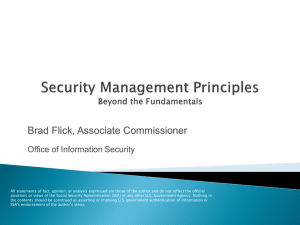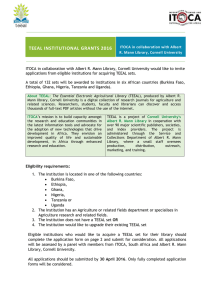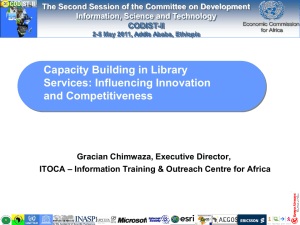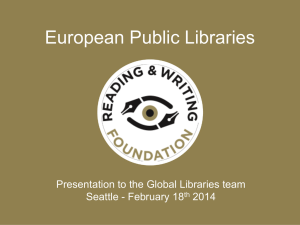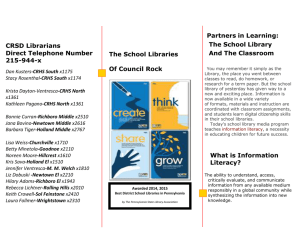GRACIAN CHIMWAZA-Capacity building_Influencing Innovation
advertisement
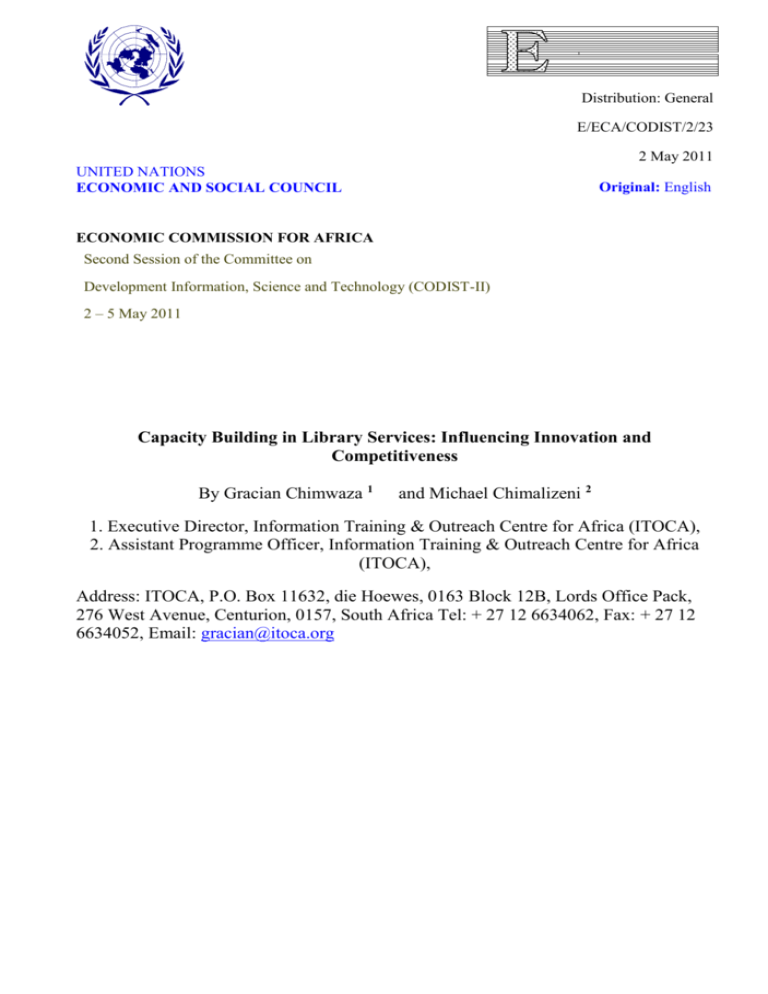
Distribution: General E/ECA/CODIST/2/23 2 May 2011 UNITED NATIONS ECONOMIC AND SOCIAL COUNCIL Original: English ECONOMIC COMMISSION FOR AFRICA Second Session of the Committee on Development Information, Science and Technology (CODIST-II) 2 – 5 May 2011 Capacity Building in Library Services: Influencing Innovation and Competitiveness By Gracian Chimwaza 1 and Michael Chimalizeni 2 1. Executive Director, Information Training & Outreach Centre for Africa (ITOCA), 2. Assistant Programme Officer, Information Training & Outreach Centre for Africa (ITOCA), Address: ITOCA, P.O. Box 11632, die Hoewes, 0163 Block 12B, Lords Office Pack, 276 West Avenue, Centurion, 0157, South Africa Tel: + 27 12 6634062, Fax: + 27 12 6634052, Email: gracian@itoca.org Abstract Research and academic institutions in most of the Sub-Saharan Africa (SSA) region continue to face challenges in developing sustainable libraries that meet the needs of their clientele. In ord er to address these challenges the institutions need qualified library, faculty and research staff with the relevant ICT and information skills to deliver high quality services. Building capacity in the information discipline comes with its challenges similar to many disciplines including issues of funding, training, aligned and supporting policies, management commitment and the institution’s high level of e-Readiness to foster an environment that supports successful implementation of ICT programmes. This paper outlines the case of ITOCA and its partners in undertaking TEEAL and Research4Life programmes, Training-of-Trainer workshops and users support in the SSA region over the last 12 years. About 80 short courses were developed and delivered to address the knowledge and skills gaps. The courses were tailor-made to meet the needs of librarians, faculty and researchers across the region emphasizing on improving practical, technical and facilitation skills. Keywords: ICT capacity building, ITOCA, TEEAL, e -Readiness, library services, Research4life 2 1. Introduction 1. Whilst the generation, storage and diffusion of new knowledge and information at academic and research institutions in Africa are improving, there remains many challenges of capacity that need to be addressed if these institutions are to reach their potential and significantly contribute to the goals of social and economic development across the continent. The role of the library is critical in all these processes. The advent of ICT’s and more specifically the Internet in the last two decades has spurred on the role of the library and helped enhance its services to the users. 2. The investment and use of Information Communication Technologies (ICTs), an initiative actively supported by the libraries has greatly impacted the ability to access knowledge and information for users throughout the research and academic communities worldwide. In Sub-Saharan Africa (SSA) research and academic institutions, significant strides have been made in this area. But a lot remains to be done. Whilst the IT and Internet infrastructure have improved significantly over the last decade in the region, several other challenges continue to affect access to knowledge and information over the Internet by users. Expensive Internet bandwidth, limited access to computers and inadequate user skills are key barriers limiting the access and use of information at the institutions particularly those located in remote areas far from the capital cities. In order to address the issues of capacity building for the libraries the broader challenges of capacity building have to be taken into account. These include several intertwined issues that must be carefully considered at the institutional and country levels in order to address the challenges of capacity building.These include training; funding; aligned and relevant policies; management/leadership commitment and the institution’s e-Readiness. 3. Using the case-study approach, this paper discusses these capacity building challenges in the context of SSA and looks at innovative initiatives in Library services by the Information Training & Outreach Centre for Africa (ITOCA) and its partners to address such challenges thereby promoting local content development and improvement at academic and research institutions in the region. II. Capacity building challenges at Sub-Saharan Africa research and academic institutions libraries 4. Important issues that come up time and again when discussing the challenges impeding human capacity building at the academic and research institutions in the SSA region reaffirm the need for a concerted effort from both internal and external players to move the bar higher. Inadequate training funding budgets, lack of well designed training programmes; inappropriate or non-existent policies; lack of management commitment and institutional environments that have minimal e-Readiness to foster implementation of the ICT4D programmes are major issues identified as hampering effective capacity building in the libraries at institutions in the region experienced during the ITOCA Eresources training programmes in many of the SSA countries. 5. Funding: Without the required funding budgets allocated for capacity building in the libraries all great ideas, good intentions and splendid plans will not yield anything. No doubt, highly trained staff is a key building block to the delivery of quality research output and competitive graduates which are the bottom line issues of the research and academic institutions. Many of the written and much publicized organizational visions and missions attest to these outputs. 6. External funding sourced by ITOCA and partners is used to cater for the training resource persons’ time, travel, workshop logistics and participants’ subsistence during the delivery of the Training-ofTrainer courses. Selected local universities and research institutions host the week-long workshops attended by 25-30 professionals. Only 30-35% of the universities and research institutions have gone on to support institutional trainings after the trained librarians and faculty return from the courses. A smaller percentage (3-5%) have supported their staff training in the ITOCA ToT courses since the course series inception in 1999 in terms of registration (tuition) fees, travel and subsistence costs. Reports by course graduates point to the lack of institutional support and budgets to support their 3 efforts in imparting the acquired knowledge to their colleagues and library clients across the institutions. 7. Training: The development of innovative training programmes with appropriate content aimed at addressing the staff skills gaps according to the needs of the staff and matching their professional portfolios and assigned duties. The courses must be tailored to add to previously attained skills and practical enough to help the staff tackle the problems at hand and in their line of work avoiding the case of investing in irrelevant courses that limits the return on this investment. 8. Supporting policies: Lack of relevant and appropriate institutional policies to promote the role of the library and its services and address staff development programmes at the institutions is still a challenge at some of the institutions in the SSA region. A practical example that we came across is where a faculty may have programmes promoting such ICT policies on requirements for researchers, faculty and students to deposit and archive electronic copies of research papers, theses and dissertations in institutional repositories and databases but without overall university level supporting aligned policies, the implementation and practice of such critical strategies is difficult. 9. Management/leadership commitment: Management buy-in and realising the important role of the libraries and their contribution to the overall agenda of the organisation and showing this support through supportive policies and prioritising library and capacity building budgets. During the ITOCA ToT workshops, many of the hosting universities principal officers and Institute directors take time to officially open the training courses which encourages and gives prominence to the courses. Unfortunately these great gestures have not yet translated into positive decisions on library budgets and policies at many of the research and academic institutions that these courses have been delivered. 10. e-Readiness: The institutional environment needs to support the continued development of the libraries and personnel’s skills improvement in order to have the capacity and motivation to deliver high quality services in a robust electronic environment. Until the institutions’ e-Readiness improves efforts by the professionals to leverage ICT tools such as digital libraries, Institutional repositories and virtual collaborating spaces will not bear much result. Cole (2005) asserts this point well in his five point e-Readiness investment plan recommended specifically for universities which includes: a) ICT facilities and network access; b) Personnel available to support the design and production of digital materials such as CDs, web pages, and distance learning (training) packages; c) Academic programmes including field experience opportunities that prepare students for applying ICT to communication and development; d) University policies that encourage faculty participation in community outreach programs; e) A faculty ICT posture -for example, a positive disposition toward the use and efficacy of ICT in education, teaching and learning. The balance in these investments is required to foster a good environment for the implementation of meaningful ICT programmes at the institutions. 11. Internet access, which has improved in recent years with the launch of the undersea fibre optic cables on both the eastern and western coasts and the ongoing public and private investments in inland infrastructure linking up research stations and universities to high speed undersea fibre optic cables. However, the SSA region still remains behind the other continents. Recent International Telecommunications Union (ITU) figures indicate that between 2002 and 2008 Internet users per 100 in SSA increased significantly from 0.52 to 5.68. The divide becomes glaring when compared to other emerging regions with China having leapt from 4.60 users in 2002 to 22.28 in 2008 (UNESCO, 2010). Compounding this is the issue of limited and expensive bandwidth which at $ 2,100 per Megabyte for a DSL connection in Africa is the highest in the world (FAO, 2009). Limited access and exposure to the Internet invariably contributes to the problem of inadequate user skills because of lack of practice. This continues to be a major barrier to fully taking advantage of access to up-to-date research and scholarly information and hence the need for capacity building in such disciplines as information literacy and ICT/ICM skills for both the information brokers and end users at the institutions. 4 III. Capacity building initiatives by developing agencies 12. In response to these challenges, ITOCA in the last 12 years has taken the lead in undertaking several training initiatives to enhance innovation and competiveness in scientific and technical research in collaboration with other international and local players interested in building capacity at research and academic institutions in the region focusing on improving library services. One such programme is ITOCA’s involvement in the promotion, training and support for digital library resources (e-resources) focusing on the access and use of such resources like The Essential Electronic Agricultural Library (TEEAL) (www.teeal.org), Research4Life (www.research4life.org) and PROTA (www.prota.org). These interventions tailored to suit the specific needs of each group support the organization’s broader objective of building the ICT/ICM skills of African librarians, information management specialists, faculty and researchers. 13. Several other initiatives have invested in different ways trying to address the capacity building challenges from different angles as shown in Table 1 below: Table 1: Library Capacity Building Initiatives Organization Initiative Strategic Partnerships INASP Programme for the Enhancement of Research Key stakeholders including Information (PERI)-Now in its 10th year the researchers, librarians, programme Focuses on the needs of people in publishers, ICT developing and emerging countries; PERii professionals and policy works with partners to support global research makers); Professional communication by further strengthening: the Associations, National knowledge and skills of people working in Research and Education research communication participation in Networks (NRENs), international knowledge networks research Learned societies and communication policy and practice. Academies and other sister http://www.inasp.info/ organizations Association Of Commonwealt h Universities (ACU) Carnegie Corporation The Africa Unit-The concept of the Africa Unit is rooted in the conviction that Africa’s institutions of higher and further education must be at the heart of any sustainable effort to rebuild and revitalize the continent, and that if Africa’s institutions are to play this role a major and sustained programme of renewal must occur. This approach, following the G8 Africa Action Plan, is to promote the creation of partnerships to support the research and higher education capacity of Africa. http://www.acu.ac.uk/key_strengths/partnership s Higher Education and Libraries in Africa-The main objectives of Carnegie Corporation’s work in Africa are to enhance the capacities of educators, researchers and academic leaders in selected countries; to improve the use of information and communication technologies in teaching, research and management and to create public and university libraries to deepen academic research and public access to information and knowledge. These goals represent integrated pathways toward strengthening the next generation of academics and university leaders in Africa. http://carnegie.org/programs/higher-educationand-libraries-in-africa/ ACU works at promoting linkages between African and European Universities African Universities and public libraries for example its University of Pretoria Library Leadership programme. 5 Medical Library Association/ Librarians Without Borders CTA E-resource training in Health Information-The aim of this initiative is to address the vast information resource inequity existing between different regions of the world. http://lwbonline.org/ African Institutions including Universities and Non-Governmental Organizations such as ITOCA The ICT4D/ICM services Programme-Provides CTA with the impetus to play an increasingly significant role in ensuring that ACP organizations increasingly adopt and use new and conventional ICTs in an integrated manner to manage information on agriculture and rural development. The programme will build on CTA’s interventions since 2002 and will focus on (i) awareness raising and networking; (ii) capacity building (including human resources, infrastructures and institutions); and (iii) access to relevant information. http://www.cta.int Public Libraries Programme-Identifies and funds various innovative public libraries initiatives in developing countries http://www.gatesfoundation.org Provides Funding support for training programmes including the TEEAL and Research4Life programmes PHEA Partnership for Higher Education in Africa PHEA represents both a belief in the importance and viability of higher education in Africa and a mechanism to provide meaningful assistance to its renaissance. Investment at leading universities in the region during 20012010 http://www.foundation-partnership.org/ A joint project of Carnegie Corporation The Ford Foundation, the John D. and Catherine T. MacArthur Foundation, the Rockefeller Foundation, the William and Flora Hewlett Foundation, the Andrew W. Mellon Foundation, and the Kresge Foundation. Phi – Partnerships in Health Information Phi is involved in initiatives aimed at building the capacity of librarians and other information professionals in Africa to strengthen health information services, including facilitating training and exchange programmes for librarians and information professionals. www.partnershipsinhealthinformation.org.uk Health information workers and libraries in Ethiopia, Kenya, Sierra Leone, Tanzania, Uganda and Zambia, Other emerging partnerships in other countries. FARA FARA is the Forum for Agricultural Research in Africa, an umbrella organization bringing together and forming coalitions of major stakeholders in agricultural research and development in Africa. FARA complements the innovative activities of national, international and sub-regional research institutions to deliver more responsive and effective services to its stakeholders. http://www.fara-africa.org/aboutus/ Partnership on the RAILS programme funded by FAO in collaboration with Sub-Regional Organisations and NARS e.g. KARI, ZARI, Bill and Melinda Gates Foundation The programme encourages public libraries to reach out to their communities, partnering with local government, business and other organization 6 AGRIS IMARK III.1 AGRIS provides worldwide bibliographic coverage of agricultural science and technology literature. Assembled by the AGRIS Coordinating Centre, the Food and Agriculture Organization (FAO) of the United Nations, AGRIS offers an international perspective on crucial agricultural research. http://agris.fao.org/knowledge-and-informationsharing-through-agris-network The Information Management Resource Kit (IMARK) is a partnership-based e-learning initiative to train individuals and support institutions and networks world-wide in the effective management of information. IMARK consists of a suite of distance learning resources, tools and communities on information management. A result of a continuing partnership between CGIAR, GFAR and FAO along with national research centres and research information units. Led by FAO in collaboration with over 30 partner and contributing organizations and is coordinated through a Steering Group ITOCA’s E-Resources Training-of-Trainer Model 14. The approach employed is on delivering training-of-trainer platforms aimed at empowering the participants with both technical, facilitation skills and confidence to go back to their institutions and pass on the gained skills to their colleagues, clients and students thereby creating a cascading effect downstream. This model has helped the interventions to reach thousands of researchers, faculty and students in SSA in the last 12 years making it a more cost effective approach in the much resourced face-to-face education model. 15. In partnership with International Development Agencies such as FAO, WHO, UNEP and CTA, Cornell University’s Mann Library (USA), and the Institute of Development Studies (UK), ITOCA has organized TEEAL/Research4Life programmes week long courses in 38 Sub-Saharan African countries following a Training-of-Trainer (ToT) model. This means that every course graduate is well equipped with the skills that enable them in-turn to go back to their base stations and train their colleagues, students and clients in their home-institution. Such an approach necessitates the incorporation of basic facilitation skills as part of the course. Mixing of information end-users such as faculty, researchers and students with information brokers (librarians and information specialists) results in a collaborative learning environment where the brokers are made aware of end-user expectations and vice-versa. III.2 Course Content: 16. Customized curricula that are continually refined and updated were developed for each specified group and lessons learned through a comprehensive feedback mechanism after each course. This ensured that each course was further refined to meet the needs of the participating institutions and course attendees. Basic course content focused on developing basic World Wide Web and database search strategies, general information literacy and facilitation skills. 17. Further advanced courses for selected trainers were delivered in 2010 through a partnership with the Institute of Development Studies (IDS) of UK and the Albert R. Mann Library at Cornell University aimed at empowering the trainers with workshop facilitation skills and promoting the integration of information literacy skills in University curricula. III.3 Workshops Audience: 18. Since 1999, ITOCA in partnership with local universities and research institutions has organized and delivered about eighty (80) training-of-trainer courses on E-resources training spanning 38 SSA countries at an average of seven workshops per year. The workshops have to date reached 1760 librarians, researchers and academics cascading the skills gained to an estimated 15,000 individuals 7 downstream. Librarians form the majority of professionals trained during these workshops followed by lecturers and researchers as Figure 1 below depicts. 19. To strike a gender balance and encourage the participation of more women in scientific research, ITOCA aimed for a balance of 50% for female attendants. However out of a total of 1760, (589 were female), a 34% female participation was achieved. Figure 1: Professions Trained during TEEAL/R4L workshops Category Audience Information brokers Librarians/Info managers: 216 IT Managers: 93 End Users Reseachers: 104 Lecturers Professors: 117 Other(technical officers, etc) Other : 8 Table2: Types of Trained Participants in 80 courses IV. Lessons Learned and Recommendations 20. The years and time spent training professionals from the Sub-Saharan Africa region has given ITOCA first hand lessons and experience on the various factors affecting skills capacity and local content development. Overall the findings can be summed up as follows: IV.2 Improved access to current research: 21. Whilst the trainings’ outcomes generally indicate improved access to current scientific research over the Internet at selected participating institutions in the SSA region over the years through such online programmes as the Research4life programmes (AGORA, HINARI and OARE) -low awareness about e-resources available to users and low user skills remain as important barriers to the uptake and use of library e-resources among both the information brokers and end users in the research and academic communities in the region (FAO, 2009). These challenges have a direct impact on the quality of local research and local publishing work the researchers, faculty and students can undertake and produce given the limited resources at their disposal. The ability to write research manuscripts for publishing, competitive grant proposals and other information intensive undertakings is affected. IV.3 Libraries play an important role in building information skills: 22. The problem of low user skills amongst end users can only be effectively addressed if information enablers such as librarians and information specialist continue to press on with their role as information brokers empowering researchers, faculty and students with the necessary information literacy and search skills. Libraries need to be better resourced and equipped if this is going to be a reality for the SSA region. IV.4 Face-to-face training intervention costs continue to rise: 23. The costs of putting together and delivering a week long face-to-face workshop range from $600$1000 per participant (unit costs) in the SSA region taking into account the travel for resource persons, 8 participants’ subsistence and venue and material costs. These rising costs have encouraged ITOCA and its partners to seek and deliver virtual online courses to increase the reach of these courses. Tools like Moodle www.moodle.itoca.org have been deployed, though it is early days to assess the effectiveness of this strategy. IV.4 Increasing local support for e-resources training courses: 24. Universities and research institutions seem more willing to host and support e-resources training courses in the region than before. This could be taken as an indication of confidence by the hierarchy at the institutions in the development of ICT/ICM skills among their staff in the region. In the last two to three years, internal budgets have been used to support the costs of venue and Internet access for the workshop by the hosting institutions. These logistics were previously all funded externally by funding organisations. IV.5 Increased local research content published in digital libraries: 25. Digital libraries and programmes continue to accelerate growth in the collection of local content from the SSA region as reflected in the TEEAL, AGORA and HINARI collections thereby improving its access both locally and internationally. This could be attributed to the increased access to international publications that is spurring local researchers to contribute their innovations to international publications doing so competitively given the improved access to information via eresources and improved user skills gained from the training interventions. V. Conclusion 26. While building local research continues to be a challenge, such capacity building interventions by ITOCA, its partners and many other similar initiatives which have been undertaken over the years seem to contribute significantly to the research and academic communities in the SSA region by focusing on building and strengthening library skills and services. IT and Internet infrastructure need to be upgraded and updated, the ratio of computers accessible by researchers needs to improve and bandwidth costs reduced to affordable levels in order to support the institutional e-environment. The issues of funding, aligned and relevant policies, management commitment and the institution’s eReadiness cannot be left out if the challenges of capacity building are to be tackled effectively. Overall, the culture of research must increasingly be promoted across the different disciplines for continued tangible new knowledge generation that will positively impact on social and economic development in the SSA region. 27. These ITOCA e-resources courses continue to empower librarians and other information brokers and contribute significantly to the building of ICT/ICM capacity of faculty, researchers and students in the research and academic institutions. These training programmes play an important role in influencing innovation and competitiveness in Sub-Saharan Africa. 9 References COLLE, R. (2005, MARCH 26). Building ICT4D capacity in and by African universities. International Journal of Education and Development using ICT [Online], 1(1). Available: http://ijedict.dec.uwi.edu/viewarticle.php?id=13. UNESCO, 2010. Science Report 2010: the current status of science around the world. UNESCO, 2010, p 14. FAO, 2009. Factors Affecting Information Uptake in Universities in Developing Countries: a user study of Research 4 Life Programmes at selected Universities in Five Countries. FAO Report 2009, p 22. 10 11
